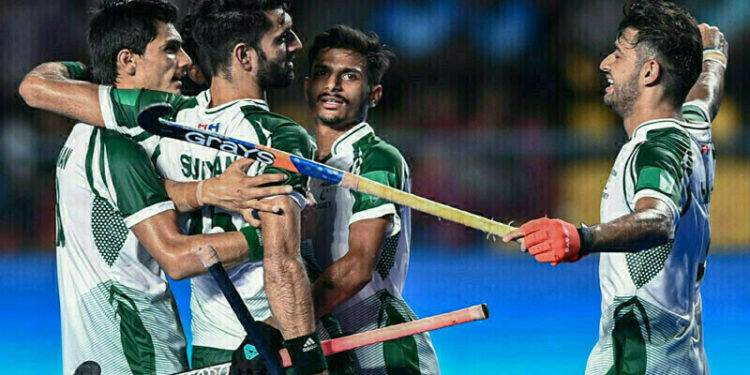In a significant development for Asian field hockey, Pakistan has officially declined to participate in the upcoming Asia Hockey Cup 2025, which is scheduled to be held in Rajgir, India, from August 27 to September 7, 2025. The Pakistan Hockey Federation (PHF) cited security concerns and a lack of formal assurances from the Indian government as primary reasons behind this decision. The move has led the Asian Hockey Federation (AHF) to consider replacing Pakistan with Bangladesh in the tournament lineup.
This decision underscores ongoing diplomatic tensions between Pakistan and India, particularly in the realm of sports, where political and security issues have long cast a shadow over bilateral tournaments and regional competitions.
PHF Confirms Withdrawal: Safety First
Speaking to media outlets, Secretary of the Pakistan Hockey Federation, Rana Mujahid, reaffirmed that the safety of the national team players remains a top priority.
“We had security concerns before, and those concerns remain unresolved. The Indian government has not provided any concrete security assurances for our players,” Rana Mujahid stated.
He emphasized that the PHF is bound to follow the directives of the Government of Pakistan, which had previously denied permission for the national team to travel to India in light of escalating threats from extremist groups.
A Troubled History of Sporting Hostilities
This is not the first time Pakistan has refused to send its athletes to India for international sporting events. Historically, strained relations between the two nuclear-armed neighbors have affected bilateral series across cricket, hockey, and other sports. In recent years, political tensions, border conflicts, and the revocation of Article 370 (which stripped Jammu and Kashmir of its special status) have further intensified mistrust between the two nations.
In this particular case, right-wing extremist groups in India had reportedly issued threats to the Pakistan hockey team if they traveled for the Asia Cup. According to sources within the PHF, these threats were considered serious enough to warrant government intervention.
“We communicated our concerns to both India and the Asian Hockey Federation well in advance. Unfortunately, no action was taken to allay our fears,” added Rana Mujahid.
AHF’s Response: Bangladesh as Replacement
Following Pakistan’s withdrawal, the Asian Hockey Federation (AHF) quickly began planning to ensure the tournament proceeds as scheduled. The AHF is now considering Bangladesh as a potential replacement for Pakistan in the eight-nation event.
As of now, the confirmed participating teams include:
- India (host)
- China
- Japan
- Malaysia
- South Korea
- Oman
- Chinese Taipei
The inclusion of Bangladesh would maintain the eight-team format, ensuring a balanced and competitive structure for the tournament.
Interestingly, Rana Mujahid noted that the PHF had not been formally informed about the inclusion of Bangladesh. He expressed dismay at the lack of communication from the AHF, calling it a breach of protocol.
Implications for Pakistan’s World Cup Qualification
Despite pulling out of the Asia Cup, Pakistan’s hopes of qualifying for the FIH Hockey World Cup 2026 are not entirely dashed. The Asia Cup is one of the qualifying routes for the World Cup, but alternative avenues remain available, including:
- Continental championships
- FIH Pro League rankings
- Special qualification tournaments
“Missing the Asia Cup is unfortunate, but we are committed to exploring all remaining pathways to ensure Pakistan is represented at the World Cup,” said the PHF Secretary.
Historically, Pakistan has been a powerhouse in international hockey, having won the World Cup four times (1971, 1978, 1982, and 1994). However, the sport has witnessed a steep decline in the country in recent decades, largely due to poor infrastructure, lack of funding, and administrative controversies.
The Rise of Security as a Determinant in Sports Diplomacy
Security concerns have increasingly played a pivotal role in sports diplomacy across the subcontinent. In the past, both India and Pakistan have denied visas or refused participation in events hosted by the other due to hostile bilateral relations.
Similar Precedents:
- India refused to send its cricket team to Pakistan for the Asia Cup 2023, leading to a hybrid model where matches were hosted in both Pakistan and Sri Lanka.
- Pakistan declined participation in the 2016 Kabaddi World Cup held in India.
- Pakistan hockey teams have had visa delays or denials multiple times in the past while traveling to India for international events.
The politicization of sports, especially cricket and hockey, which are hugely popular in both countries, continues to be a contentious issue. International bodies like the International Hockey Federation (FIH) and the International Olympic Committee (IOC) have urged both nations to separate politics from sports, but such appeals often fall on deaf ears in the face of rising nationalism and internal political pressure.
Security Concerns: Real Threat or Political Excuse?
Critics argue that Pakistan’s decision could be more political than logistical. However, given the reported threats by Indian extremist organizations, the concerns raised by the PHF and the Pakistani government cannot be dismissed lightly.
Security analysts note that Rajgir, the host city in India’s Bihar state, is not considered a high-risk zone. However, in a charged political climate, symbolic events like a Pakistan team’s visit can become flashpoints for domestic extremist groups.
“You can’t take chances with national athletes in a politically sensitive country,” said one retired Pakistani diplomat. “If something were to happen, the diplomatic fallout would be enormous.”
India’s Silence on Security Assurances
So far, the Indian government has not issued an official statement regarding Pakistan’s refusal or the alleged threats. Nor has there been a public acknowledgment of efforts to provide security guarantees to the visiting team.
This silence has drawn criticism from sports analysts and former hockey players who believe that sports should serve as a bridge in diplomacy, not a victim of political standoffs.
Reactions from the Hockey Community
In Pakistan:
- Many former players and sports officials have backed the PHF’s decision.
- They emphasized the importance of protecting players and avoiding unnecessary risks in hostile environments.
In India:
- Some hockey veterans expressed disappointment, stating that the absence of Pakistan diminishes the competitive spirit of the Asia Cup.
- Others echoed concerns that politics continues to cast a shadow over international sports.
Future of Indo-Pak Hockey Ties
Pakistan and India have a rich hockey rivalry, stretching back decades. Both nations have clashed in numerous finals and knockout stages of Asian and global competitions, delivering memorable matches.
However, in recent years, there has been a glaring absence of bilateral series. Political tensions, visa issues, and mutual distrust have made regular fixtures nearly impossible.
Until both governments take active steps toward de-escalation, the dream of seeing India and Pakistan face off on the hockey field in a peaceful and competitive spirit will remain elusive.
Conclusion
The withdrawal of Pakistan from the Asia Hockey Cup 2025 serves as yet another reminder of how political and security concerns can deeply influence international sporting events. While player safety must always come first, the continued deterioration of Indo-Pak sports relations deprives millions of fans of the excitement and unity that sports can foster.
As Bangladesh steps in to replace Pakistan, the tournament will move forward. However, the absence of one of Asia’s most historically significant hockey teams will undoubtedly be felt. It remains to be seen whether diplomatic or sports officials from both nations can someday build a bridge strong enough to carry the weight of their turbulent history and reignite one of the region’s most passionate sporting rivalries.

























